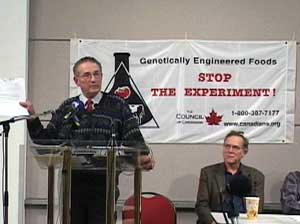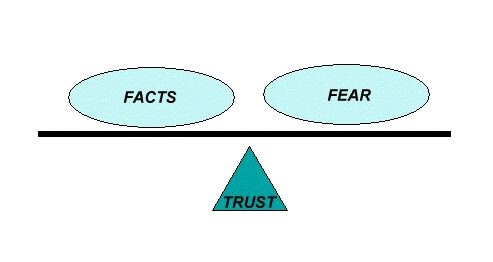Terminator technology refers to plants that have been genetically modified to render sterile seeds at harvest – it is also called Genetic Use Restriction Technology or GURTS. Terminator technology was developed by the multinational seed/agrochemical industry and the United States government to prevent farmers from saving and re-planting harvested seed. Terminator has not yet been commercialized or field-tested but tests are currently being conducted in greenhouses in the United States.
“Terminator is a direct assault on farmers and indigenous cultures and on food sovereignty. It threatens the well-being of all rural people, primarily the very poorest.”
- Rafael Alegría of Via Campesina, an organization representing over 10 million peasant farmers worldwide.
Terminator Technology: Suicide Seeds Are Back! Introduction and Background (pdf) ( html)
Terminator Technologie: Das Comeback des Suizid-Saatguts Hintergrund (pdf) (html)
Tecnologia Terminator: As Sementes Suicidas Estão de Volta! Antecedentes (pdf) (html)
Genetic Use Restriction Technology (GURTs) is the “official” name for Terminator technology that is used at the United Nations and by scientists. It refers to a general category of technologies that, in their design, provide a mechanism to switch previously introduced genes on or off, using external inducers like chemicals or physical stimuli (e.g. heat shock). This mechanism allows for restricted use or performance of transgenes. There are two main categories of GURTs, namely trait-related or T-GURTs and variety-related or V-GURTs. Whilst T-GURTs aims to control the use of traits such as insect resistance, stress tolerance or production of nutrients, V-GURTs aims to control reproductive processes that will result in seed sterility, thus affecting the viability of the whole variety. (V-GURTs is a concept, with many different potential designs.) The ability to switch the GURTs mechanism on or off externally enables the producer to exercise control either over traits or the viability of seeds (Source: EcoNexus www.econexus.info)
Purpose: The Ban Terminator Campaign seeks to promote government bans on Terminator technology at the national and international levels, and supports the efforts of civil society, farmers, Indigenous peoples and social movements to campaign against it.
Strategy: The international de facto moratorium on Terminator technology at the United Nations Convention on Biological Diversity (CBD) is under attack. Two upcoming meetings of the CBD where Terminator is on the agenda – the Working Group on Article 8 (j) in Granada, Spain January 23-27 and the 8th Conference of the Parties to the CBD in Curitiba, Paraná, Brazil March 20-31 2006 – offer important opportunities to strengthen the moratorium. The build-up to these meetings is also an important opportunity to encourage governments to establish national prohibitions on Terminator technology – just as Brazil and India have done. Corporations will not stop efforts to commercialize Terminator until governments prohibit the technology.
Origins: The Ban Terminator Campaign was initiated in response to recent efforts by governments and corporations to push for Terminator field trials and commercialization. Despite widespread opposition, in February 2005, the Canadian government attempted to overturn the CBD’s international de facto moratorium on Terminator technology The Ban Terminator Campaign was formed in response, following discussions initiated by Canadian-based civil society organizations (ETC group, Inter Pares, National Farmers Union, and USC Canada).
History: In 1998, ETC group (then RAFI) discovered Terminator patents. In 1999, in response to the avalanche of public opposition, two of the world’s largest seed and agrochemical corporations, Monsanto and AstraZeneca (now Syngenta), publicly vowed not to commercialize Terminator seeds. In 2000, the United Nations Convention on Biological Diversity adopted a de facto moratorium on Terminator seeds. As a result, many people believed that the crisis had passed, and the issue faded from public view. Unfortunately, Terminator is still being developed and is now being heavily promoted. Click here to read Statements Against Terminator or see documents at www.etcgroup.org
Structure:
The Ban Terminator Campaign’s steering committee:
AS-PTA (Assessoria e Serviços a Projectos em Agricultura Alternativa) www.aspta.org.br
ETC Group (Action group on Erosion, Technology and Concentration) www.etcgroup.org
GRAIN www.grain.org
Indigenous Peoples Council on Biocolonialism www.ipcb.org
ITDG (Intermediate Technology Development Group) www.itdg.org
Pesticide Action Network – Asia and the Pacific www.panap.net
Third World Network www.twnside.org.sg , www.biosafety-info.net
Via Campesina www.viacampesina.org
Contact:
Ban Terminator
contact@banterminator.org
www.banterminator.org
Phone: 1 613 241 2267
Fax: 1 613 241 2506
431 Gilmour Street, Second Floor
Ottawa, Ontario
Canada K2P 0R5
The following was retrieved from: http://www.banterminator.org/news_updates/audio_and_video/terminator_on_trial
Videos from the Terminator on Trial event in Ottawa, 20th March 2005
Percy Schmeiser (the Canadian farmer who took on Monsanto after his crops were contaminated by their GM seed) asks what kind of a legacy we want to leave for future generations.
Percy Schmeiser discusses the potential effect of Terminator on removing farmers' rights and abilities to recover from blight and disease in crops.
Dr Vandana Shiva discusses the health impacts of eating "dead food".
Dr Vandana Shiva contrasts the prayer of farmers - for seed to always have life - to the prayer of the corporations pushing Terminator Technology.
Dr Vandana Shiva talks about the impacts of releasing terminator into ecosystems.
Dr Vandana Shiva at Terminator on Trial describes terminator as a "crime against nature".
The following was retrieved from: http://workingtv.com/percyschmeiser.html
Prairie Farmer vs. Corporate Giant
Webcast of Saskatchewan farmer Percy Schmeiser, December 10, 2003 at the Vancouver Public Library.
Percy Schmeiser has been fighting lawsuits by Monsanto, a Bio Tech giant and major producer of Genetically Modified seeds, for several years. Still looking for justice, he takes his David versus Goliath appeal to the Supreme Court in January. Monsanto successfully sued him for patent infringement after “Roundup Ready” canola was found on his land — not because he planted it, but through seed cross-contamination.
He spoke to a standing-room only crowd in Vancouver . . .















































